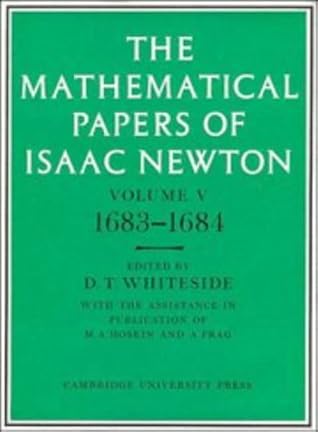- Bible
- Read the Bible
- Bible Versions
- Verse of the Day
- Reading Plans
- Verses by Topic
- Books of the Bible
- Bible Images
- Study
- Commentaries
- Concordances
- Dictionaries
- Encyclopedias
- Sermons
- Bible Atlas & Maps
- BP Wiki
- Devotionals
- Today's Devotionals
- Light of the World
- All Devotionals
- Inspirational Quotes
- More
- Picture Quotes
- Videos
- Inspirational
- Bible Study
- What The Bible Says
- Bible Q&As
- Daily Bread
- Bible by Genre
- Bible Stories
- Random Bible Verse
- Community
- Store
The Mathematical Papers of Isaac Newton: Volume 5, 1683-1684
by Isaac Newton
The fifth volume of this definitive edition centres around Newton's Lucasian lectures on algebra, purportedly delivered during 1673-83, and subsequently prepared for publication under the title Arithmetica Universalis many years later. Dr Whiteside first reproduces the text of the lectures deposited by Newton in the Cambridge University Library about 1684. In these much reworked, not quite finished, professional lectiones, Newton builds upon his earlier studies of the fundamentals of algebra and its application to the theory and construction of equations, developing new techniques for the factorizing of algebraic quantities and the delimitation of bounds to the number and location of roots, with a wealth of worked arithmetical, geometrical, mechanical and astronomical problems. An historical introduction traces what is known of the background to the parent manuscript and assesses the subsequent impact of the edition prepared by Whiston about 1705 and the revised version published by Newton himself in 1722. A number of minor worksheets, preliminary drafts and later augmentations buttress this primary text, throwing light upon its development and the essential untrustworthiness of its imposed marginal chronology.
BUY NOW
Hardcover, 650 pages
Published July 28th 1972 by Cambridge University Press (first published June 27th 1969)
tags: science
© 2025 Bibleportal.com All rights reserved.

Sir Isaac Newton was an English physicist, mathematician, astronomer, natural philosopher, alchemist, and theologian who is considered one of the most influential people in human history.
Newton remains influential to scientists, as demonstrated by a 2005 survey of scientists in Britain's Royal Society asking who had the greater effect on the history of science, Newton or Albert Einstein. Newton was deemed the more influential.[8]
Newton also wrote on Judaeo-Christian prophecy, whose decipherment was essential, he thought, to the understanding of God. His book on the subject, which was reprinted well into the Victorian Age, represented lifelong study. Its message was that Christianity went astray in the 4th century AD, when the first Council of Nicaea propounded erroneous doctrines of the nature of Christ. The full extent of Newton's unorthodoxy was recognized only in the present century: but although a critic of accepted Trinitarian dogmas and the Council of Nicaea, he possessed a deep religious sense, venerated the Bible and accepted its account of creation. In late editions of his scientific works he expressed a strong sense of God's providential role in nature.
... Show more